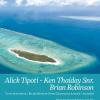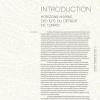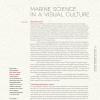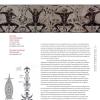







Editions Arts d'Australie - Stéphane Jacob, 2016
In association with Suzanne O'Connell, Brisbane, Australia
Texts by Sally Butler
Bilingual work: French - English
Format / Dimensions 26 x 21 cm
Paperback, 60 pages, 42 illustrations
ISBN : 979-10-95931-01-0
In the Eastern Torres Strait Islands’ language of Meriam Mir there is a term, maiso mir, that means ‘the murmur of the Great Barrier Reef heard from the island of Mer’. The Reef, one of the seven natural wonders of the world, begins in waters northeast of Mer (Murray Island) and is nurtured by the pristine ocean environment and abundant marine life of the Torres Strait. With over 274 small islands spread across 48,000 square kilometers, life in the Torres Strait depends on co-existing with the elements of the ocean, the weather, and the seasons. The poetry of these natural surroundings has always inspired its Indigenous population and it continues to motivate their artists today. Artists from the region produce exceptionally innovative conceptual seascapes that capture far more than a visual record of the marine location. The art derives from understanding nature’s rhythms, cycles, and character. Torres Strait Islands (TSI) artists have a unique expertise in characterizing their natural environment as part of their spirituality, and their own being. They express how people of the Torres Strait do not try to conquer Nature but instead understand themselves as part of its beauty.
A delicate balance between population and natural resources evolved in the Torres Strait over 3,000 years of human habitation. Islands across the region are geo-physically diverse, ranging from fertile hilly volcanic terrain to low-lying sandy islands, or mangrove forests growing in saline coastal conditions. Diverse island ecosystems led to equally diverse subsistence lifestyles, and cultural and linguistic distinctions between the Eastern and Western regions - and differing dialects within these language groups. Language is always important to cultural identity because it is a vehicle for people who identify as a community to share their unique vision of the world. As the German philosopher Ludwig Wittgenstein said, “The limits of my language mean the limits of my world”. This is particularly significant for oral cultures such as Aboriginal Australians and Torres Strait Islanders. Identities, laws, and moral codes, are encoded in their unique languages – there are no written texts to consult and instead inherited wisdom is encoded in their language, their storytelling, dance, song, and visual arts.